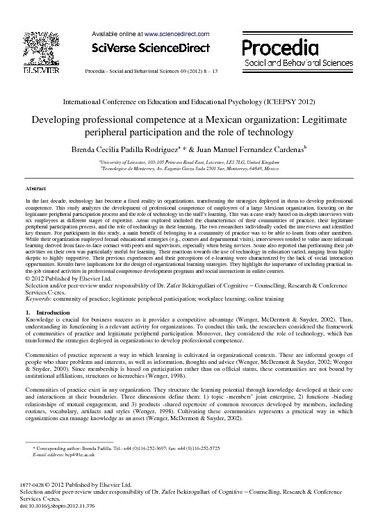| dc.contributor.author | Padilla Rodriguez, Brenda C. | en |
| dc.contributor.author | Fernández Cárdenas, Juan M. | en |
| dc.date.accessioned | 2015-09-18T13:13:42Z | en |
| dc.date.available | 2015-09-18T13:13:42Z | en |
| dc.date.created | 2012-01-01 | en |
| dc.date.issued | 2013-04-24 | en |
| dc.identifier.uri | http://catedra.ruv.itesm.mx/handle/987654321/653 | en |
| dc.identifier.uri | http://hdl.handle.net/11285/577641 | en |
| dc.description.tableofcontents | . | en_US |
| dc.format.extent | 6 | en_US |
| dc.format.medium | Documento escrito original | en_US |
| dc.language.iso | eng | en |
| dc.relation.requires | Requiere contar con el software Adobe Acrobat Reader versión 3 o superior | en_US |
| dc.rights.uri | http://creativecommons.org/licenses/by-nc-nd/4.0/ | * |
| dc.title | Developing professional competence at a Mexican organization: Legitimate peripheral participation and the role of technology | en_US |
| dc.type | Elemento / Element | en |
| dc.coverage | In the last decade, technology has become a fixed reality in organizations, transforming the strategies deployed in them to develop professional competence. This study analyzes the development of professional competence of employees of a large Mexican organization, focusing on the legitimate peripheral participation process and the role of technology in the staff’s learning. This was a case study based on in-depth interviews with six employees at different stages of expertise. Areas explored included the characteristics of their communities of practice, their legitimate peripheral participation process, and the role of technology in their learning. The two researchers individually coded the interviews and identified key themes. For participants in this study, a main benefit of belonging to a community of practice was to be able to learn from other members. While their organization employed formal educational strategies (e.g., courses and departmental visits), interviewees tended to value more informal learning derived from face-to-face contact with peers and supervisors, especially when being novices. Some also reported that performing their job
activities on their own was particularly useful for learning. Their reactions towards the use of technology in education varied, ranging from highly skeptic to highly supportive. Their previous experiences and their perceptions of e-learning were characterized by the lack of social interaction opportunities. Results have implications for the design of organizational learning strategies. They highlight the importance of including practical inthe-job situated activities in professional competence development programs and social interactions in online courses. | en_US |
| dc.subject.keyword | community of practice | en |
| dc.subject.keyword | legitimate peripheral participation | en |
| dc.subject.keyword | workplace learning | en |
| dc.subject.keyword | online training | en |
| dc.subject.discipline | Ciencias Sociales / Social Sciences | |
| dc.agent.name | Ramírez Montoya, María S. | es |
| dc.agent.name | Burgos Aguilar, José V. | es |
| dc.educationLevel | Posgrado | en_US |
| refterms.dateFOA | 2018-03-07T04:57:55Z | |


